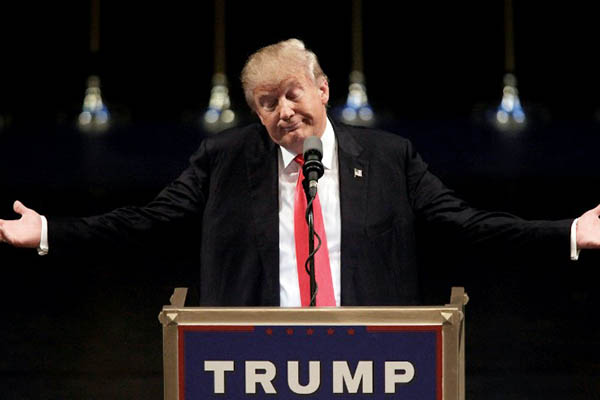
John Gurzinski—AFP
Reports warn breach of ‘One China’ policy can destroy Sino-U.S. relations.
Chinese state media said on Sunday that U.S. president-elect Donald Trump’s “inexperience” led him to accept a phone call from Taiwan’s leader but warned that any breach of the One China policy would “destroy” Sino-U.S. relations.
The call “exposed nothing but [Trump’s] and his transition team’s inexperience in dealing with foreign affairs,” said an editorial in the English-language China Daily newspaper, adding there was “no need to over-interpret” it. But it hinted at the possible economic impact of any breakdown in ties, saying that China held $1.19 trillion in U.S. treasury bonds and had bilateral trade worth $558 billion with the country last year. “If Trump wants to overstep the One China principle, he will destroy Sino-U.S. ties,” it said.
Trump’s call with Tsai Ing-wen on Friday broke with decades of U.S. foreign policy precedent, raising questions on whether it marked a deliberate pivot away from Washington’s official “One China” stance. Washington cut formal diplomatic relations with the island in 1979 and recognizes Beijing as the sole government of “One China”—while keeping friendly, non-official ties with Taipei.
China regards self-ruling Taiwan as part of its own territory awaiting reunification under Beijing’s rule, and any U.S. move that would imply support for independence would likely trigger fury.
Trump congratulated Tsai on her election as president this year and discussed the “close economic, political and security ties” of the U.S. and Taiwan, according to the president-elect’s office. Beijing said it made solemn representations to the U.S. after the call, which was initiated by Taiwan.
But its response has largely been muted, with most criticism in state media directed at Tsai, who has enraged mainland authorities by taking a more independent stance than her Beijing-friendly predecessor. The often nationalistic Global Times newspaper in an editorial on Saturday threatened that Tsai would “pay the price” if Taiwan “crosses the red line,” and said China would “use its power without hesitation” to punish any move toward independence. It attributed the call to her administration’s “tricks,” noting that Trump “is not familiar with foreign relations.”
Trump’s advisers have signaled a friendlier stance toward the island of 23 million, which enjoys a democratic government and vibrant press unlike the communist-ruled mainland. In a November article for Foreign Policy magazine, Trump advisers Peter Navarro and Alexander Gray wrote that the Obama administration’s treatment of Taiwan had been “egregious” and called for more support of “this beacon of democracy in Asia [that] is perhaps the most militarily vulnerable U.S. partner anywhere in the world.”
After the Trump-Tsai call, the outgoing Obama administration said it had not changed its stance. “There is no change to our longstanding policy on cross-Strait issues,” National Security Council spokeswoman Emily Horne told reporters. “We remain firmly committed to our ‘One China’ policy,” she added. “Our fundamental interest is in peaceful and stable cross-Strait relations.”
